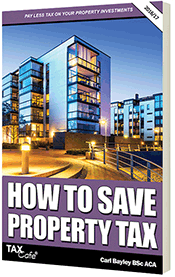Business Property Tax Guide:
Rent or Buy Premises?
Property Tax Benefits & Drawbacks
IS IT better to rent or buy your business premises?
A few years ago, the answer seemed obvious. With commercial property prices rising by over 20% a year and mortgages easily obtained, the advice from Dave down the pub was, “Why pay rent when you could be paying off a mortgage? It’s like throwing your money away.”
The latest information can be found in our guide:
How to Save Property Tax
What Dave didn’t see through his beer goggles, however, was that property prices can also go down. Since 2007, commercial property values have fallen by up to 50% in some areas.
More aggressive investors are now starting to bargain hunt but prices could continue falling because rents are under enormous pressure. The Royal Institute of Chartered Surveyors recently reported confidence in the rental outlook only slightly above the record lows earlier in the year.
So what are the pros and cons of renting or buying business premises? There are both tax and non-tax issues to consider.
Tax Relief
Rent paid for business premises is generally fully tax deductible, whatever type of business you have.
The same goes for interest paid on any mortgage or other loan to buy business property. Most of the actual cost of the property itself, however, will not usually attract any tax relief – with capital allowances only available on some of the fixtures, fittings and equipment within the property.
Eventually, over time, this means that renting usually produces more tax relief. On the other hand, the proportion of the cost of most business property eligible for capital allowances has increased significantly recently and you do have a valuable asset at the end of the day!
Capital Gains Tax
If you buy your own trading premises, you may qualify for several capital gains tax reliefs that other property investors do not enjoy. Note the word ‘trading’. This means that investment businesses (e.g. property investment businesses) do not generally qualify.
Rollover Relief allows you to roll over your capital gains into the purchase of new trading property. You can buy the new property between a year before and three years after selling the original property.
This effectively defers any capital gains tax liability on the original property until the new property is sold and gives your business flexibility to change premises and grow without adverse tax consequences.
All of the old property’s sale proceeds must be reinvested. Any shortfall is deducted from the amount of gain eligible for rollover. Relief is also restricted if there is less than full trading use of the property.
Entrepreneurs Relief
Entrepreneurs Relief allows individuals to pay capital gains tax at an effective rate of just 10% when they sell their business premises, but generally only if they sell their business as well.
Remember, however, if you sell your premises without selling your business, you may not have to pay capital gains tax immediately, as you can defer the gain using Rollover Relief.
Entrepreneurs Relief may also sometimes be available where a company owner or business partner personally owns the company or partnership’s trading premises. Relief is restricted where rent is paid for the use of the property after April 2008 however.
Entrepreneurs Relief is also subject to a lifetime limit of just £1 million of capital gains per person.
Property Pensions
Commercial property is one type of direct bricks and mortar property investment you can put inside your self-invested personal pension (SIPP).
Investing via a SIPP allows you to effectively buy property at a 40% discount, paid for by the taxman, as well as completely avoiding both income tax and capital gains tax.
The problem with SIPPs is the severe borrowing restriction – generally no more than 50% of net assets. Even if you have £100,000 sitting in your SIPP account, you can only borrow an extra £50,000. Not many commercial properties come that cheap.
Nevertheless, for those with large pension savings, who can afford to make big pension contributions, or can team up with business associates, this is still a viable option.
In summary, buying your own trading premises could produce additional tax benefits not enjoyed by other property investors.
Non-Tax Benefits & Drawbacks
When you buy business premises using a mortgage, you are generally swapping rent for interest. Effectively the bank becomes your landlord! These are the pros and cons:
- Depending on the level of interest rates, property prices and rental values, one route will always be cheaper than the other and the disparity will change over time. Every property is different.
- If you rent you will never be exposed to falling property values. However, given that the market has already dropped, it may be better to focus on the future capital growth potential.
- Rents can be more predictable than interest payments and can be agreed many years into the future. Interest payments can be fixed but not usually for long periods.
- A long lease agreement could bind your business and harm its growth.
- Tenants do not enjoy the same security as owners – they have no control over the long-term location of their businesses.






